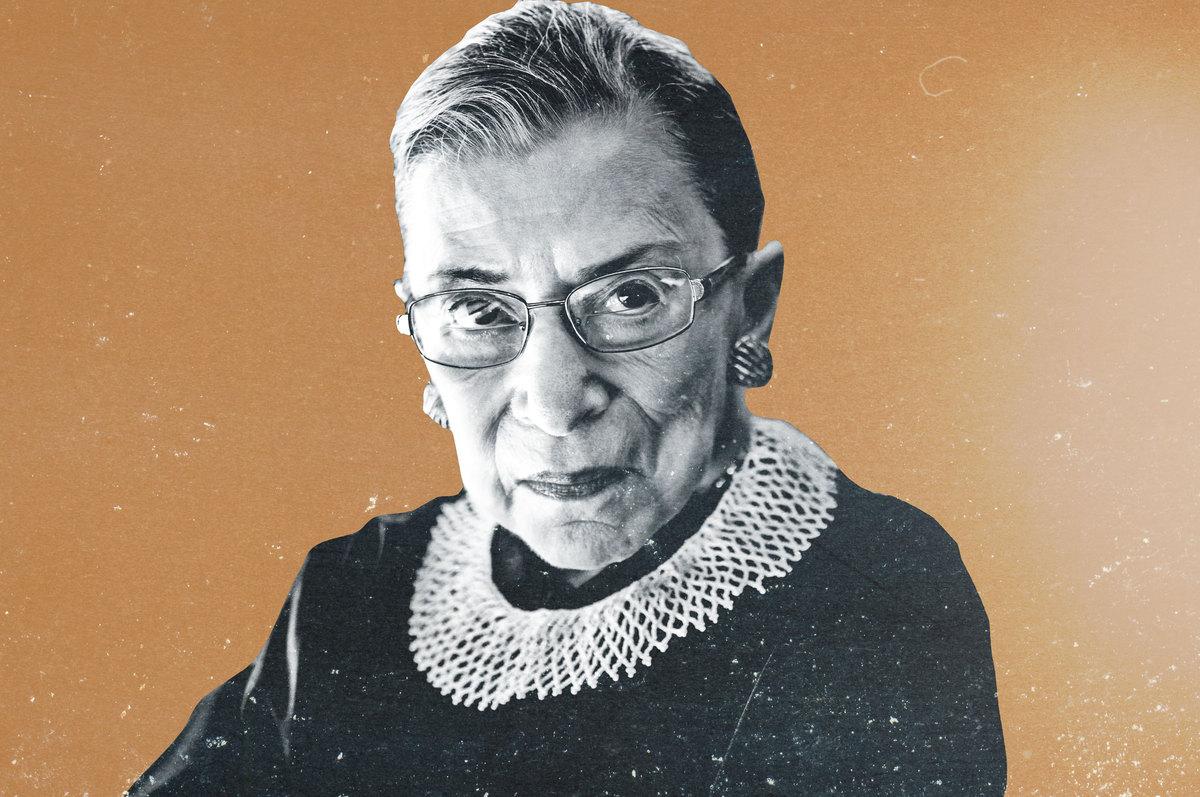Ruth Bader Ginsburg’s Dissent Was a Rallying Cry
The Supreme Court justice and trailblazer for gender equality died Friday at age 87. How do you mourn the legacy of someone whose absence means so much immediate danger?
Justice Ruth Bader Ginsburg died from complications of pancreatic cancer on Friday. She was 87.
She was a trailblazer for gender equality in both her decades of jurisprudence and in the contours of her own life—one of just nine women in her class at Harvard Law School, and just the second woman appointed to the Supreme Court. She spent nearly three decades as a member of the highest court in the land, where she became the loudest and clearest voice of the liberal end of the court.
In 2014, she penned a blistering dissent to the court’s decision in Burwell v. Hobby Lobby, in which the majority ruled that employers could use religious exemptions to deny women contraceptive coverage. Noting the court’s refusal to distinguish between corporations and religious institutions, she wrote, “your right to swing your arms ends just where the other man’s nose begins.”
Her dissent became a rallying cry for those aggrieved by the court’s decision, and launched her into a new sort of spotlight. “Ginsburg has indeed produced forcefully written dissents, especially as the Court has moved to the right, but they are not themselves immoderate,” Jill Lepore wrote in 2018. “Instead, they scold her colleagues for their immoderacy.” Yet, under the mantle of “the Notorious RBG”—a nickname coined by a law student a year before Hobby Lobby to celebrate a different fiery dissent—she became an icon and a meme to a new generation, becoming perhaps the very first judge to have an online fan base. Her likeness was emblazoned across greeting cards, mugs, pillows, action figures, baby mobiles, even bras.
Her legacy was crystallized well before President Clinton nominated her to the court. After graduating at the top of her law class, she struggled to find work with firms uninterested in hiring a woman. Nevertheless, she eventually secured a clerkship, kicking off a historic legal career. In the 1970s, she orchestrated a fastidious dismantling of gender bias, using case after case to construct a bulwark around women’s rights.
That her death should come this year—this horrible, horrible year—is breathtakingly cruel. With the presidential election scarcely a month and a half away, her passing is fated to be weaponized politically—a fact she seemed to be all too aware of in her final days. On Friday, NPR reported that she dictated a somber message to her granddaughter, even “as her strength waned”: “My most fervent wish is that I will not be replaced until a new president is installed.”
For Democrats, Ginsburg’s is a loss both devastating and terrifying. Donald Trump has long campaigned on his record of reshaping the federal judiciary with conservative judges—appointments that will reverberate decades into the future. He may now have the chance to appoint a third Supreme Court justice, and is sure to use that possibility—his ability to pack the courts, his inevitable complaints about any Democratic attempts to postpone an appointment until after the election—to rally his supporters to the polls.
Months ago, Senate Majority Leader Mitch McConnell bragged to GOP donors that he would push Ginsburg’s replacement through no matter how close her death came to the election. “He’s saying it’s our October Surprise,” a former Trump White House official told The New Yorker. And sure enough, the man who engineered the chamber’s refusal to vote on Obama nominee Merrick Garland in 2016, handing Trump his first Supreme Court pick, has already pledged that a Trump nominee will get a vote.
It is a bitter and horrible thing, this coupling of heartbreak and fear. How do you mourn the legacy of someone whose absence means so much immediate danger? What will become of the Supreme Court now? What will this mean for the election, with the stakes now viscerally higher and the incumbent’s argument for himself somehow, perversely, stronger to his supporters? How much did Ginsburg endure in her final years as she considered these very questions, deciding each time, apparently, that she had to carry on working even as she grew sicker?
It is a grief multiplied: for a champion of justice, for the things she dedicated her life to, for a present that seems bleaker with each passing day. Ginsburg spent her life working within imperfect systems—ones that did not, at least at first, value her, but which she nonetheless resolutely set about shifting ever closer to justice. It is a timely lesson: If she ever felt a tinge of hopelessness, she never let it slow her down.

